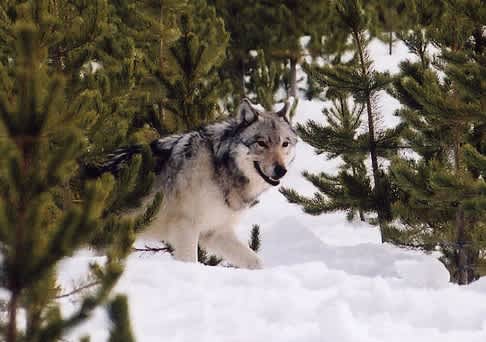Michigan Wolf Hunt Proposals Fail, Impact on Future Seasons Unclear
OutdoorHub Reporters 11.05.14

Michigan’s debate over its controversial wolf hunting season came to a head on election day this week as voters decided whether or not they supported Proposals 1 and 2. Although the two hunting proposals affirmed the state’s ability to designate wolves as a game species among other things, the measures were actually added to the ballot by animal rights groups that opposed wolf hunting. Both proposals failed.
Keep Michigan Wolves Protected (KMWP), along with the Humane Society of the United States (HSUS), urged their members to vote “no” on both measures.
“The citizens of Michigan have voted by wide margins to reject both laws enacted by the legislature, not only rejecting wolf hunting but also the attempt to transfer authority to the Natural Resources Commission to declare hunting seasons on protected species,” stated Jill Fritz, director of the KMWP, in a press release before all the votes were even tallied.
However, the failure of the proposals does not mean that Michigan has seen its last wolf season. In August, state legislators passed The Scientific Fish and Wildlife Conservation Act, which waived hunting and fishing license fees for active military members, allocated $1 million in funding to fight Asian carp, and perhaps more importantly, protected the Natural Resources Commission’s (NRC) ability to designate game species. Supporters of the wolf hunt, which include many hunters, biologists, and residents of the areas where the predators are found, said that the passage of this law makes the outcome of Proposal 1 and 2 practically “moot.”
“We encouraged our members to vote ‘yes,’ but we didn’t spend any advertising money on the proposals because we’d already won the issue by passing the Scientific Fish and Wildlife Conservation Act,” said Drew YoungeDyke, public relations manager for Michigan United Conservation Clubs, in a press release.
“The results were about what we expected,” YoungeDyke continued. “HSUS spent millions on misleading political ads and flyers to take away hunting rights, but the citizen initiative we passed in August protects those rights. I’m sure HSUS’s donors will be glad to know they spent $1.5 million on what’s essentially a public relations poll, money that could have gone to local animal shelters.”
Wolf hunting opponents feel different, and said that lawmakers should respect the decision of voters.
“The resounding rejection of Proposal 2 is an unmistakable signal to the NRC to terminate any plans in 2015 for a wolf hunt,” said Fritz. “The public does not accept its authority to make such a declaration. It’s now time for lawmakers and the NRC to heed the will of the people. The people of Michigan don’t want the trophy hunting of wolves, they don’t want more legislative tricks, and they don’t want to cede authority to an unelected group of political appointees. The NRC should honor the judgment rendered by voters come 2015, regardless of the outcome of the lawsuit to nullify the third wolf-hunting bill enacted by the legislature.”
But YoungDyke feels confident that any lawsuit against the Scientific Fish and Wildlife Conservation Act will fall flat.
“The object of that law is, as the title says, to make fish and wildlife management decisions on the basis of sound scientific fish and wildlife management, and that’s exactly what it does,” he concluded.
Evan Heusinkveld, head of Governmental Affairs at the U.S. Sportsmen’s Alliance, also explained that animal rights organizations will not be able to use a referendum against The Scientific Fish and Wildlife Conservation Act as they had done in the past with other laws.
“Since the act carries an appropriation of $1 million in funds to combat Asian carp, it means that it is not subject to the referendum process,” Heusinkveld told OutdoorHub. “In a typical law with no money attached to it, you can file a referendum against it. With the attached funds however, it makes a referendum moot.”
The long-term impact of the ballot measures and law passed by the legislature in August remains unclear. The Scientific Fish and Wildlife Conservation Act will take in effect next March, which means there will be no wolf hunting season for Michigan this year. However, even if both Proposal 1 and 2 had been approved by voters, the state’s Department of Natural Resources said that there would not have been enough time to plan a season for 2014. KMWP and HSUS have vowed to keep fighting to overturn the August law.

